

SUBSCRIBE TO OUR FREE NEWSLETTER
Daily news & progressive opinion—funded by the people, not the corporations—delivered straight to your inbox.
5
#000000
#FFFFFF
To donate by check, phone, or other method, see our More Ways to Give page.


Daily news & progressive opinion—funded by the people, not the corporations—delivered straight to your inbox.
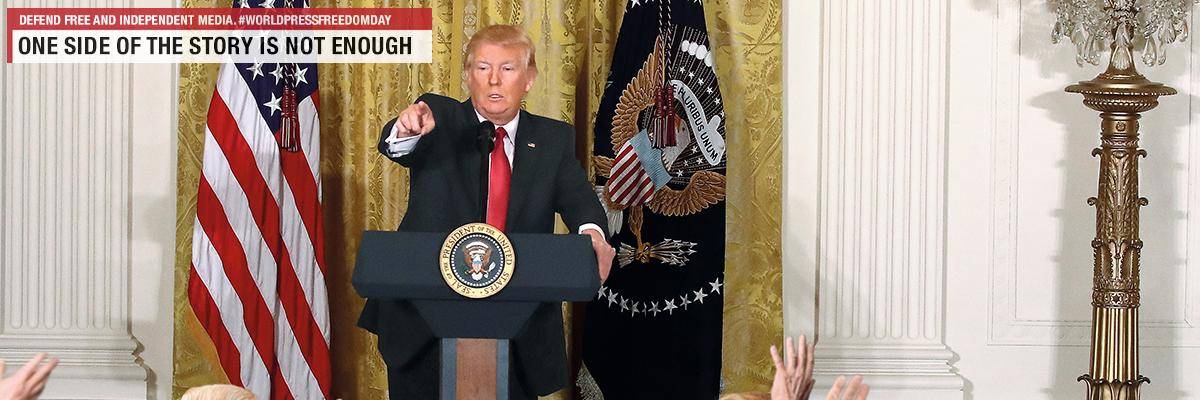
"Chipping away at the media also chips away at our right to be informed. We need access to credible information to engage meaningfully in our communities - and hold those in power to account." (Photo: IFEX)
With over 100 freedom of expression and press freedom organisations in 71 different countries, the IFEX network has its ear firmly to the ground when it comes to tracking shifts in the global climate for media.
As we mark another World Press Freedom Day on 3 May - the 25th anniversary of the very first World Press Freedom Day, in fact - one concern we share is the ramping up of efforts to control and undermine independent media. It's a problem all-too-familiar to many of our members; a new and growing concern for others. It's also reflected in UNESCO's theme for the day this year: Keeping power in check: Media, justice and the rule of law.
Chipping away at the media also chips away at our right to be informed. We need access to credible information to engage meaningfully in our communities - and hold those in power to account.
The race to control media is a race to the bottom; a race where everyone loses.
So yes, power shouldn't get to tell its own story, and the media have a critical role there. But the problem isn't just efforts from above to control the information we access. It's the Information Loops. The Bubbles. The Echo Chambers.
Sometimes these are created for us, by government efforts to contain the media, or by Facebook algorithms that limit our social media feed. Sometimes we help build them ourselves. They ensure that we hear only those we tend to agree with, voices that never make us uncomfortable, and opinions that reinforce our own. Whatever you prefer to call it, it's not good. Talking only to yourself - it's simply not healthy.
There is never just one side to any story. Democracy needs diversity, and that means a diversity of voices, and a diversity of opinions. It can't be overstated; press freedom is essential for that.
With that in mind, we chose to mark World Press Freedom Day this year by launching a series of evocative - and maybe slightly provocative - images.
We think you'll agree that there is definitely something wrong with these pictures.
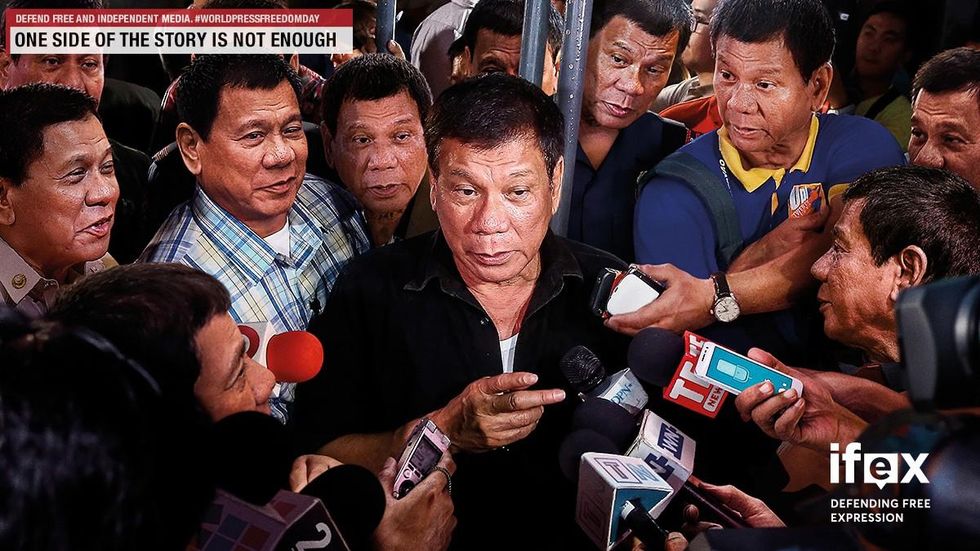
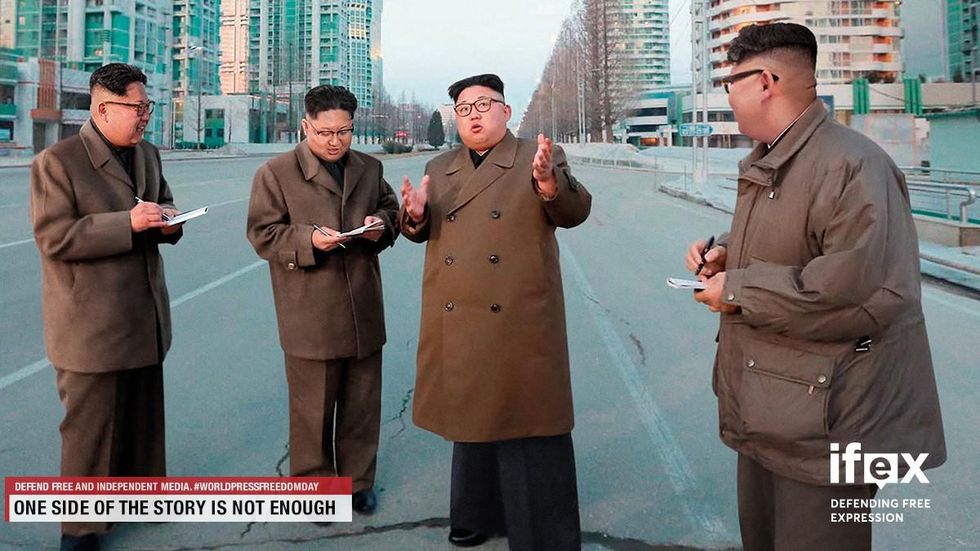
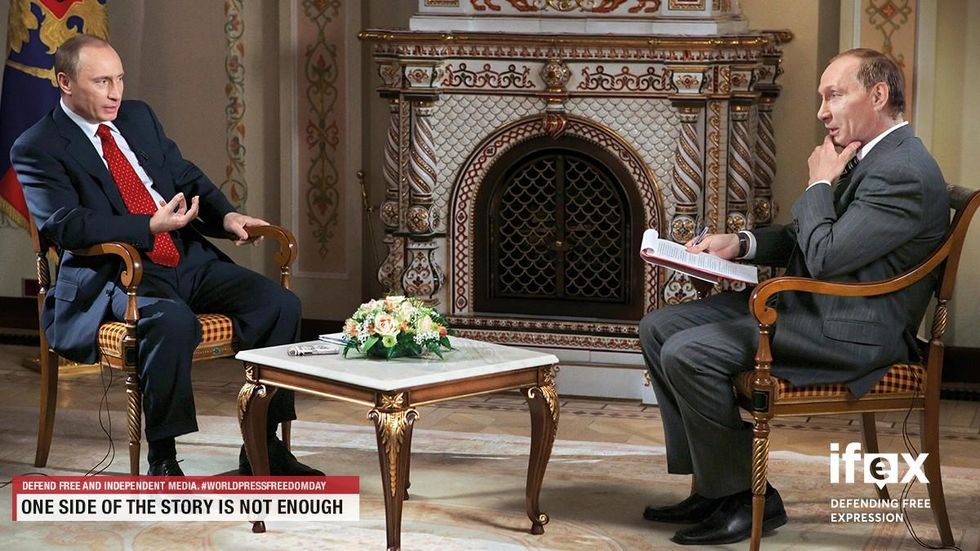
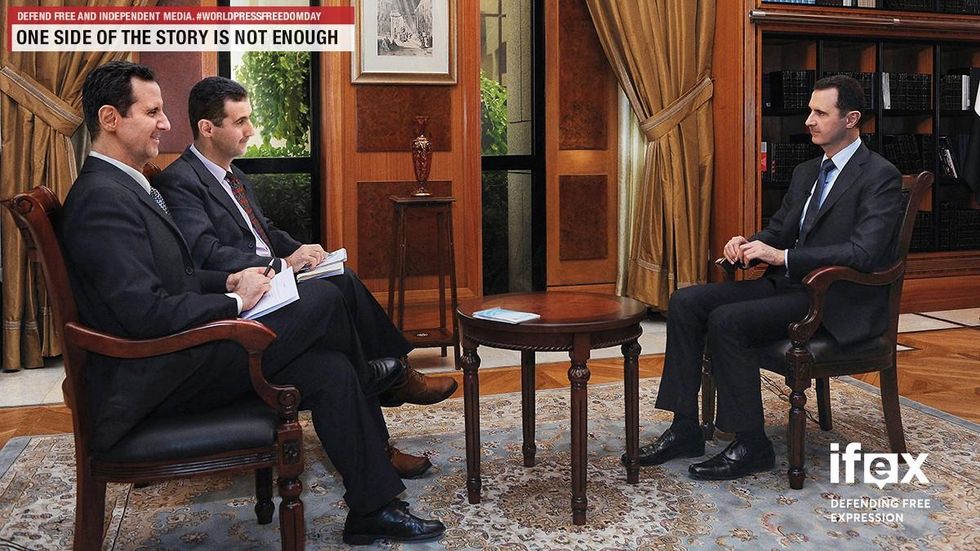
We hope everyone will join us in showing media around the world that we support them, we appreciate their efforts to bring us the many sides of each story, and we value their work. Well beyond World Press Freedom Day, the IFEX network and our allies will continue working to foster conditions that allow journalists to do their work, to not simply survive, but thrive.
Dear Common Dreams reader, The U.S. is on a fast track to authoritarianism like nothing I've ever seen. Meanwhile, corporate news outlets are utterly capitulating to Trump, twisting their coverage to avoid drawing his ire while lining up to stuff cash in his pockets. That's why I believe that Common Dreams is doing the best and most consequential reporting that we've ever done. Our small but mighty team is a progressive reporting powerhouse, covering the news every day that the corporate media never will. Our mission has always been simple: To inform. To inspire. And to ignite change for the common good. Now here's the key piece that I want all our readers to understand: None of this would be possible without your financial support. That's not just some fundraising cliche. It's the absolute and literal truth. We don't accept corporate advertising and never will. We don't have a paywall because we don't think people should be blocked from critical news based on their ability to pay. Everything we do is funded by the donations of readers like you. Will you donate now to help power the nonprofit, independent reporting of Common Dreams? Thank you for being a vital member of our community. Together, we can keep independent journalism alive when it’s needed most. - Craig Brown, Co-founder |
With over 100 freedom of expression and press freedom organisations in 71 different countries, the IFEX network has its ear firmly to the ground when it comes to tracking shifts in the global climate for media.
As we mark another World Press Freedom Day on 3 May - the 25th anniversary of the very first World Press Freedom Day, in fact - one concern we share is the ramping up of efforts to control and undermine independent media. It's a problem all-too-familiar to many of our members; a new and growing concern for others. It's also reflected in UNESCO's theme for the day this year: Keeping power in check: Media, justice and the rule of law.
Chipping away at the media also chips away at our right to be informed. We need access to credible information to engage meaningfully in our communities - and hold those in power to account.
The race to control media is a race to the bottom; a race where everyone loses.
So yes, power shouldn't get to tell its own story, and the media have a critical role there. But the problem isn't just efforts from above to control the information we access. It's the Information Loops. The Bubbles. The Echo Chambers.
Sometimes these are created for us, by government efforts to contain the media, or by Facebook algorithms that limit our social media feed. Sometimes we help build them ourselves. They ensure that we hear only those we tend to agree with, voices that never make us uncomfortable, and opinions that reinforce our own. Whatever you prefer to call it, it's not good. Talking only to yourself - it's simply not healthy.
There is never just one side to any story. Democracy needs diversity, and that means a diversity of voices, and a diversity of opinions. It can't be overstated; press freedom is essential for that.
With that in mind, we chose to mark World Press Freedom Day this year by launching a series of evocative - and maybe slightly provocative - images.
We think you'll agree that there is definitely something wrong with these pictures.




We hope everyone will join us in showing media around the world that we support them, we appreciate their efforts to bring us the many sides of each story, and we value their work. Well beyond World Press Freedom Day, the IFEX network and our allies will continue working to foster conditions that allow journalists to do their work, to not simply survive, but thrive.
With over 100 freedom of expression and press freedom organisations in 71 different countries, the IFEX network has its ear firmly to the ground when it comes to tracking shifts in the global climate for media.
As we mark another World Press Freedom Day on 3 May - the 25th anniversary of the very first World Press Freedom Day, in fact - one concern we share is the ramping up of efforts to control and undermine independent media. It's a problem all-too-familiar to many of our members; a new and growing concern for others. It's also reflected in UNESCO's theme for the day this year: Keeping power in check: Media, justice and the rule of law.
Chipping away at the media also chips away at our right to be informed. We need access to credible information to engage meaningfully in our communities - and hold those in power to account.
The race to control media is a race to the bottom; a race where everyone loses.
So yes, power shouldn't get to tell its own story, and the media have a critical role there. But the problem isn't just efforts from above to control the information we access. It's the Information Loops. The Bubbles. The Echo Chambers.
Sometimes these are created for us, by government efforts to contain the media, or by Facebook algorithms that limit our social media feed. Sometimes we help build them ourselves. They ensure that we hear only those we tend to agree with, voices that never make us uncomfortable, and opinions that reinforce our own. Whatever you prefer to call it, it's not good. Talking only to yourself - it's simply not healthy.
There is never just one side to any story. Democracy needs diversity, and that means a diversity of voices, and a diversity of opinions. It can't be overstated; press freedom is essential for that.
With that in mind, we chose to mark World Press Freedom Day this year by launching a series of evocative - and maybe slightly provocative - images.
We think you'll agree that there is definitely something wrong with these pictures.




We hope everyone will join us in showing media around the world that we support them, we appreciate their efforts to bring us the many sides of each story, and we value their work. Well beyond World Press Freedom Day, the IFEX network and our allies will continue working to foster conditions that allow journalists to do their work, to not simply survive, but thrive.